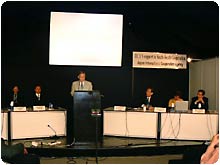South-South Cooperation
- Encouraging Ownership of Developing Countries and Supporting Various Partners -

BACKGROUND
Japan started its foreign assistance to developing countries when it joined the Colombo Plan in 1954. At that time, Japan was in the stage of rebuilding it's economic infrastructure, a part of which was funded by the World Bank. This means that Japan had two faces - a country of extending assistance as well as of receiving assistance.
Based on such experience, Japan began to support developing countries that intend to extend assistance to neighboring developing countries (South-South Cooperation) by providing know-how of aid method and networking as well as bearing financial costs. Japan has actively promoted this activity since 1975.
DISCUSSION AT THE WORKSHOP
JICA's Partner countries, namely Thailand, Chile, Tunisia and Kenya presented concrete examples on good practices and lessons learned from South-South Cooperation projects with JICA.
It was discussed that support of South-South Cooperation has various advantages and great potentials for increasing effectiveness and efficiency of development cooperation due to similarities in development stages, culture, and conditions among developing countries.
In addition, South-South Cooperation will promote ownership of the developing countries and facilitate their solidarity. And also, South-South Cooperation contributes to increasing resources for other developing countries that have bigger development needs.
JICA hopes that the discussion at the Workshop will contribute to encouraging more partner countries to further participate in South-South Cooperation, and help other donor countries/organizations fully understand the advantages of South-South Cooperation.
Back to Index
